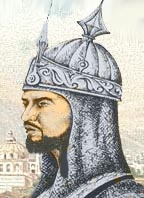Ashraf Khan
| Ashraf Shah Hotak | |||||
|---|---|---|---|---|---|
| Emir of Afghanistan | |||||

Shah Ashraf Hotak
|
|||||
| Reign | Hotak Empire: 1725–1729 | ||||
| Coronation | 1715 and 1725 | ||||
| Predecessor | Mahmud Hotak | ||||
| Successor | Hussain Hotak | ||||
| Born | Kandahar Province | ||||
| Died | 1730 Balochistan |
||||
|
|||||
| Dynasty | Hotak dynasty | ||||
| Father | Abdul Aziz Hotak | ||||
| Religion | Sunni Islam | ||||
| Full name | |
|---|---|
| Ashraf Khan Hotak |
Shāh Ashraf Hotak, (Pashto, Dari: شاہ أشرف ہوتک), also known as Shāh Ashraf Ghiljī (Pashto: شاه اشرف غلجي) (died 1730), son of Abdul Aziz Hotak, was the fourth ruler of the Hotak dynasty. An Afghan from the Ghilji Pashtuns, he served as a commander in the army of Mahmud Hotak during his revolt against the heavily declining Safavid Persians. Ashraf also participated in the Battle of Gulnabad. In 1725, he briefly succeeded to the throne (Shah of Persia) after the death of his cousin Mahmud.
The nephew of Mirwais Hotak, his reign was noted for the sudden decline in the Hotak Empire under increasing pressure from Turkish, Russian, and Persian forces.
Ashraf Khan halted both the Russian and Turkish onslaughts. He defeated the Ottoman Empire, who wanted to reestablish their former arch rivals, the Safavids, back on the throne, in a battle near Kermanshah after the enemy had come close to Isfahan. This led to peace negotiations with the Sublime Porte, which were briefly disrupted after Ashraf's ambassador insisted his master should be Caliph of the East and the Ottoman Sultan Caliph of the West. This caused great umbrage to the Ottomans, but a peace agreement was finally signed at Hamadan due to superior Ottoman diplomacy in the autumn of 1727.
...
Wikipedia
